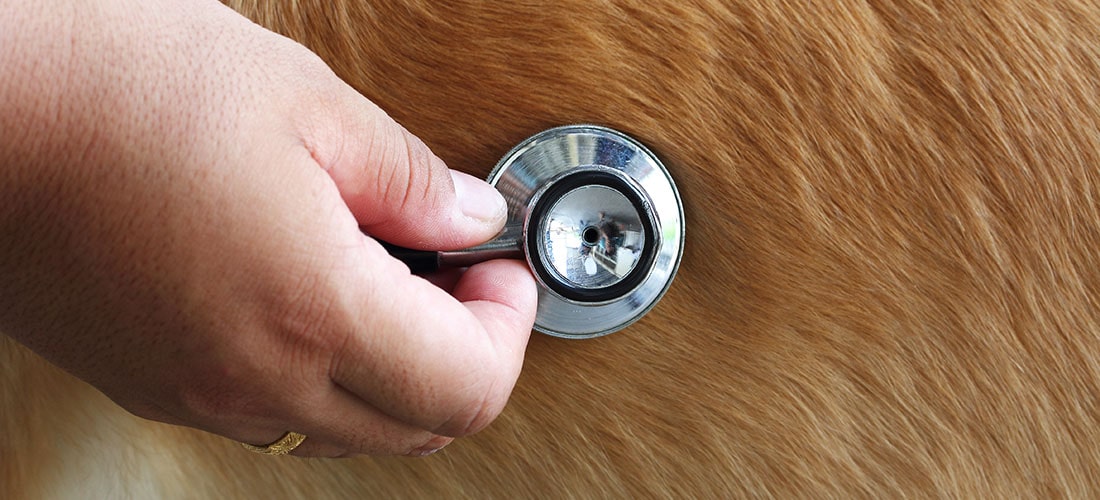Heart murmurs in dogs
Overview
- A heart murmur is a whooshing noise caused by abnormal blood flow inside the heart.
- There are a few different conditions that can cause heart murmurs in dogs.
- Not all heart murmurs are problematic; some (such as ‘innocent flow murmurs’) are harmless.
- If your dog has been diagnosed with a heart murmur, it’s important to find out what’s causing it, decide on a treatment plan (if necessary), and monitor him/her closely.
- Heart murmurs can be heard when your vet checks your dog’s heart with a stethoscope.

A heart murmur is an unusual noise in the heart (often a ‘whooshing’), that can be heard alongside the heart’s normal ‘lub-dub’ sounds. Anything that causes abnormal blood flow in (or around) the heart can cause a murmur. Some murmurs (such as innocent flow murmurs) are harmless, but some (such as those caused by heart disease) indicate a problem. Your vet can check for a heart murmur by listening to your dog’s chest with a stethoscope.
Causes
Common causes of heart murmurs in dogs include:
- Heart disease - such as mitral valve disease, a hole in the heart, narrow heart vessels, or a problem with the heart muscle.
- Anaemia and general illness - blood loss, anaemia, a high temperature and general illness can all cause a murmur.
- Pregnancy - sometimes heart murmurs can develop during pregnancy. These rarely cause problems and usually resolve after the dog has given birth.
- Innocent flow murmurs – innocent flow murmurs are harmless murmurs caused by very fast flowing blood inside the heart. Flow murmurs are common in puppies (especially fast growing/large breeds), and usually disappear by 4-6 months of age. If your puppy has a flow murmur that remains after 6 months of age, your vet may recommend some investigations to check for other causes.
Flow murmurs can also occasionally develop in healthy, athletic dogs with very strong hearts.
Grades
Vets grade heart murmurs based on how loud they are. Your dog’s murmur will either be classified as ‘low/moderate/high intensity’, or given a number from 1-6 (1 being the quietest, and 6 being the loudest). Loud murmurs tend to indicate more serious problems, but, this isn’t always the case, and in some circumstances, the opposite is true (sometimes a minor problem can cause a loud murmur, or serious problems can cause a quiet murmur). If your dog has a murmur, your vet will monitor how it changes over time.
Symptoms
If your dog has a heart murmur, your vet may ask you to monitor for other related symptoms such as:
- Coughing
- Low energy (lethargy)
- Weakness
- Trouble breathing/ fast breathing/ breathlessness
- Collapse
- Swollen abdomen
- Pale gums
Treatment and investigations
The treatment your dog needs will depend on the cause of their murmur. Some dogs don’t need any treatment to begin with, for example, if your dog has a very quiet murmur, but is otherwise well, your vet may suggest monitoring him/her to see if anything changes. However, if your dog has a loud murmur, seems unwell, or your vet is suspects an underlying problem, they may suggest investigations such as:
- X-rays
- An ultrasound scan
- An ECG (a heart trace)
- Blood tests
Heart murmurs in puppies
Murmurs in puppies are rare, but do sometimes occur. There are two main causes of murmurs puppies:
- Innocent flow murmurs - flow murmurs are caused by fast flowing blood inside the heart and often develop as a puppy grows. Innocent flow murmurs tend to be soft/quiet, present from a few weeks of age, and usually resolve without treatment by 4-6 months old (more information above).
- Congenital heart disease - congenital heart disease is a heart problem that a puppy is born with. Congenital murmurs tend to be loud and present from birth.
If you have a new puppy, it’s important to have their heart checked by a vet (perhaps at their puppy health check, or one of their vaccination appointments). If your puppy has a murmur, depending on how it sounds, your vet may suggest monitoring them or sending them for investigations. If your puppy’s breeder tell you that your puppy has been diagnosed with a murmur, it’s important to gather as much information as possible, and make sure they have a vet check.
Published: March 2021
Did you find this page useful?
Tell us more
Please note, our vets and nurses are unable to respond to questions via this form. If you are concerned about your pet’s health, please contact your vet directly.
Thank you for your feedback
Want to hear more about PDSA and get pet care tips from our vet experts?
Sign up to our e-newsletter
Written by vets and vet nurses. This advice is for UK pets only. Illustrations by Samantha Elmhurst.

